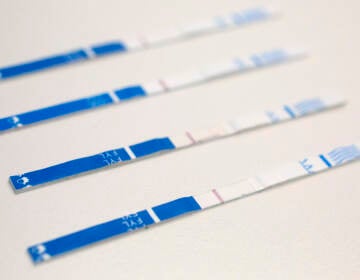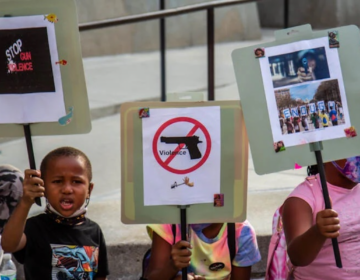University of Delaware parent-infant bonding program heading overseas
Listen
Claudette Faulkner and her son, Jymere, 9, of Philadelphia participated in a parent-infant bonding program. (Emma Lee/WHYY)
Children who have experienced adversity can develop a host of developmental or behavioral challenges. The same goes for infants.
Neglect or maltreatment in infants can make it harder for them to form bonds with adults, regulate their emotional responses and keep up regular sleeping habits.
“They’re likely to be kind of fussy and irritable and un-soothable,” said Mary Dozier, professor and Amy E. DuPont Chair of Child Development at the University of Delaware. And therefore, harder to parent, she said. “Children who have experienced adversity, they need super-parents.”
Eighteen years ago, she began work on the Attachment and Biobehavioral Catch-up Intervention, or ABC. Designed for babies between 6 months and 2 years old, the program uses rapid-fire feedback from parent coaches to recognize and reinforce nurturing impulses in parents.
How much feedback? About a comment a minute, said Dozier.
Supporting parents’ nurturing impulses helps them connect with babies who are difficult to parent. Over the course of 10 sessions in a family’s home with “anyone who wants to be there,” said Dozier, the parent coaches work to get everyone who might care for the child to read the its behavior. Being able to tell that a baby is distressed – not that it doesn’t need you – is a step towards nurturing children whose behavior might feel alienating.
Proving ABC
Careful research in the field of child welfare is hard to come by, according Jean Mercer, professor emerita of psychology at Richard Stockton College near Atlantic City. She praises ABC’s multiple randomized, controlled experiments to test if the intervention works.
“They’ve been so careful … I can’t think of another program that’s done it in this way,” said Mercer.
Another thing the program does well, according to Mercer, is sticking almost scientifically to the letter of the intervention. In many cases, she said, carrying out a welfare program is “like following a recipe, you do it a couple of times and think, ‘Oh, I can change this.’ Pretty soon, it’s not the same thing.”
But she says ABC has worked on getting the training down, so that the intervention doesn’t change too much when it’s replicated in the field. One potential drawback though, said Mercer, could be cost. Interventions that are training intensive are expensive for social service agencies to carry out. According to Dozier, carrying out the intervention costs about $1000 per family. But she said that many other programs, like Child Parent Psychotherapy, require weekly meetings for a year or more, representing a greater personnel cost per family.
In a five year follow-up, Dozier and her team have shown that babies who go through the program following adversity develop “secure, trusting relationships at much higher rates” than those in a control program.
And, their levels of cortisol – the hormone that governs the body’s sleep-wake cycle – are more normal. For babies with adverse experiences, cortisol levels remain level instead of rising in the morning to wake up and dipping at nighttime.
Now, social service agencies from North Carolina, Maryland, New York, New Orleans, Minnesota, Idaho, Kansas, Oklahoma, as well as Australia, the UK, Norway, and Germany are set to launch their own versions of the program.
WHYY is your source for fact-based, in-depth journalism and information. As a nonprofit organization, we rely on financial support from readers like you. Please give today.




